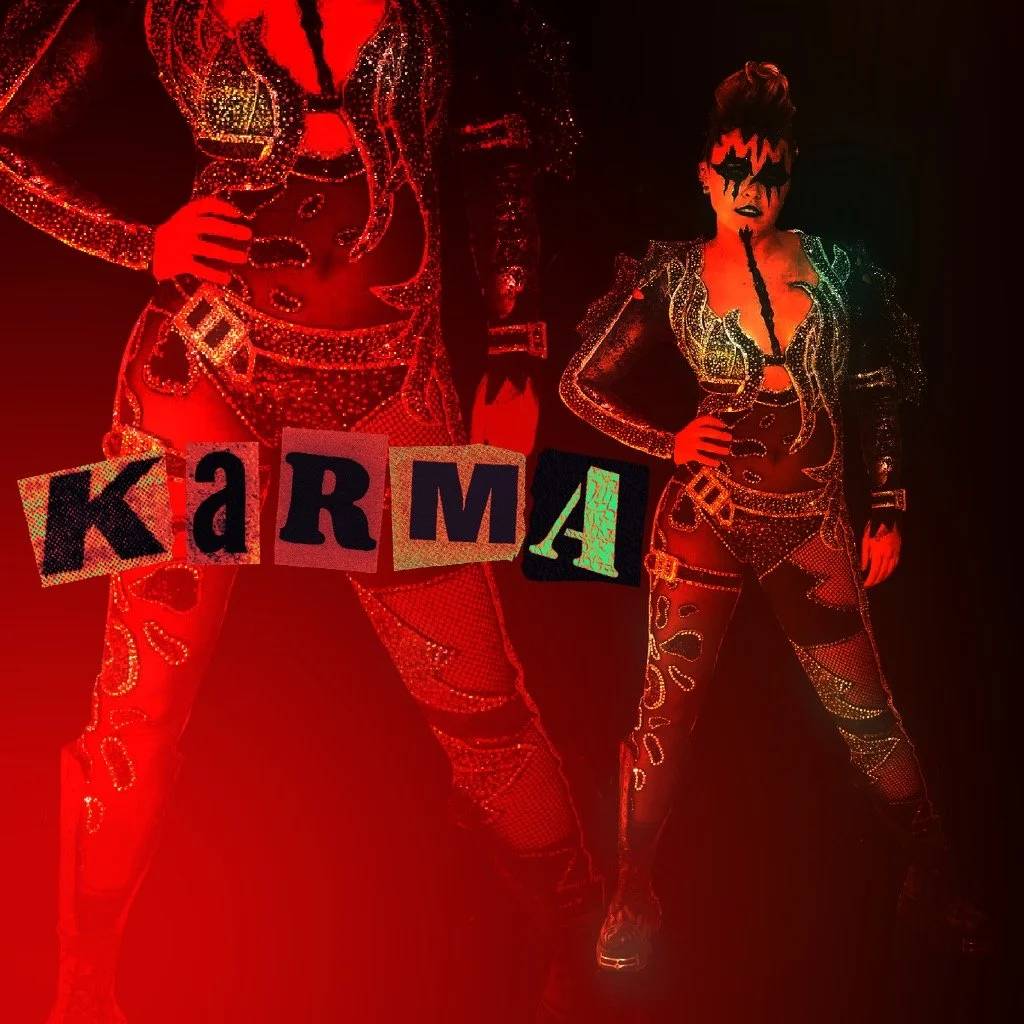She’s coming back like a boomerang? JoJo Siwa’s rebrand and what it means for queerness.
Karma's A B****, and we should have known better. If I had a wish, I would have never underestimated JoJo Siwa.
artwork by Charlotte Littlefield.
On June 22nd, 2024, I arrived at North Halstead for Chicago Pride. I was in awe of the line of people spanning four blocks from the entrance—all Gen-Zers tatted up, dressed in rainbow, covered in glitter, and a bit too drunk for noon on a Saturday. We were there (mostly) for one reason: JoJo Siwa went on at two.
Siwa pulled in record crowd sizes at Pride, beating out headliners (like Natasha Bedingfield and Bob the Drag Queen) and rocking the crowd with her small, but mighty fifteen-minute set. She sang three of her tracks, had a stage full of backup dancers, and wore some of the most oversized shoulder pads (rhinestoned, of course) that Pride had ever seen. Watching her perform, I found myself in a daze: Did I really just see her take a swig of fireball whiskey while the crowd sang Pitbull? Siwa was unapologetically JoJo, out and proud.
That was the day JoJo Siwa broke Chicago Pride, and maybe also broke me, but she had broken the internet long before then. On April 4, 2024, JoJo Siwa released her song—and music video for—“Karma” after weeks of teasing the track on TikTok. This came as part of a complete rebrand, the child star shifting aesthetics from pink pretty princess to glittery glam-rock grunge. In the opening lyrics of the single, Siwa sings of her recent infidelity to a past girlfriend: “I was a bad girl/I did some bad things,” reminding us that JoJo with the Bow Bow is dead. Not only is Siwa now dressed in black—rather than her trademark rainbow—but she is all grown up. Her bubbly, good-kid persona is gone. She is now a bad adult.
In the pre-chorus, Siwa continues:
Thou should not lie
Thou should not cheat
Thou should not get caught
or you’ll end up just like me.
These bastardized commandments emphasize her bad-girl attitude and her bad-girl actions. Siwa lies, cheats, and gets caught; you better not be a bad girl like JoJo.
Throughout the start of the music video, Siwa is seen with three different women. These interactions appear intimate, the women caressing each other’s faces and moving close as if about to kiss. Oh, and at one point, JoJo straight-up (gay-up) humps one of them. This overt and blatant sexualization completely shocked an audience used to seeing JoJo act like a child.
Siwa’s self-sexualization is a typical path undergone by many child stars upon entering adulthood and breaking anew into the mainstream. Take Miley Cyrus for example: Hannah Montana, the cutesy pop star, became a sexy, messy woman, shaking her ass, throwing her fingers into the air, and grinding on Robin Thicke. It’s no wonder that “Karma” reads exactly like an old Miley track and that Siwa has mentioned wanting a Miley moment. But why has her JoJo moment faced so much criticism? Cyrus’s expression of her sexuality was solely for the male gaze, despite her later coming out as pansexual in 2016. She danced with men, not women, and her bad-girl persona came from a heteronormative framework of female sexuality. Siwa, however, dances with, loves, and even cheats on women; she’s unabashedly gay, queer, and lesbian.
The “Karma” music video embodies a sort of campy, crafty queerness from Siwa’s over-the-top KISS-style makeup to her even bigger shoulder pads. Her look is not for everyone, and the internet has made this quite clear. But whether or not the internet would have the same reaction if Siwa kissed and grinded on girls in a bikini is another question. Would we applaud the Siwa rebrand as a woman coming into her own if her body was more feminine? The problem of Siwa is not just that she likes women, but that she likes them in a certain way.
In another rebrand, the “Descendants” actress Dove Cameron’s hit song “Boyfriend” is openly queer: “I could be a better boyfriend than him…/Plus, all my clothes would fit.” Still, Cameron maintains a hyper-feminine mainstream version of lesbianism that is easily digestible. Siwa doesn’t. The presentation of her sexuality doesn't follow the traditional sapphic model of femininity. Her lesbianism isn't soft or delicate. It’s bound in leather and glitter.
Queerness is at the forefront of Siwa’s character. She is Queer with a capital Q. From her self-appointment as the inventor of gay pop (hey Teagan and Sara) to being open about her gay relationships since 2020, she is comfortable in her skin. We call her cringy because she is the “wrong” kind of bad girl and the “wrong” kind of gay girl. Through all the hate, she doesn’t seem to care. She remains herself and won’t change for anyone.
Yes, maybe a lot of us went to Chicago Pride to see JoJo Siwa as a joke because she is cringy. But we also went because she is queer, and we love her for that.
edited by Samuel Espinal Jr.
artwork by Charlotte Littlefield.

